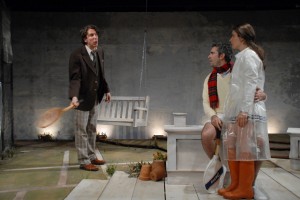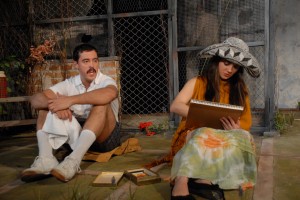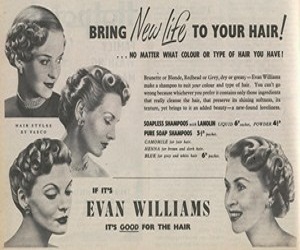
Some people have these effortless lives; they’re naturally thin, they’re quick to laugh, they work to play, they enjoy their time off, they don’t give much thought to trifling matters and somehow everything is easy for them, things go their way, and they almost never suffer a bad day. These people give off a certain glow – and make the others around them seem not so much dull in comparison but almost tarnished. Meet Richard and Anthea (Michael W. Murray and Aleksandra Stattin) two happily unmarrieds who glide through their life and are blissfully ignorant of the teeth gnashing, behind-the-back grumbling, and sideways glances their dear friends are prone to exhibit whenever they’re in the proximity of this Golden Pair.

James Liebman, Michael W. Murray and Aleksandra Stattin (Photo credit: Gili Getz)
Joking Apart, written by Alan Ayckbourn and directed by Peter Jensen is not so much a play about the happiness of two people over the course of twelve years, but rather a play about how a life of uncomplicated, fluid existence can chip away at those who must bear witness to it.
Richard’s business partner, Sven (James Liebman) and his wife Olive (Stephanie Seward) make a first impression that’s a bit swanky and pretentious, but as the years roll past Sven’s jealousy of Richard’s innate business savvy and Olive’s jealousy of Anthea’s natural lithe figure make their puffed up personalities easily deflatable – even as their figures become bloated over the years from too much abundance with too little fulfillment.
New to the neighborhood when the play starts are Hugh (Michael J. Connolly) the new vicar, and his skittish, proper wife Louise (Alison Blair). As a couple they have a very specific idea of how things are done, but soon enough, the more Hugh is exposed to the joie de vivre exhibited by Richard and Anthea the more the audience (and perhaps even Hugh himself) finds that the strict boundaries of “we don’t do that!” are more Louise’s edict than joint decisions arrived at by the couple. Even their never-seen but oft-alluded-to son, Christopher, is a pale copy of the (also invisible but nonetheless) robust children of Anthea’s who seem to thrive in the chaotic bubble created by Mum and her live in partner.
Added in to this jumble is Brian (Sebastian Montoya), connected to the group in a number of ways. He not only works for Richard and Sven but also – long ago . . . and that includes Before Richard – was a shoulder to lean on for Anthea when she left her husband with her two little children in tow. For three months he provided shelter, emotional and financial support, and in the course of those months he fell madly in love with her. Never brave enough to admit it he’s kept quite all these years, satelliting around her glowing world, nose pressed against metaphorical glass, aching with longing but too sorry, and sorrowful to press on with his own life.

Sebastian Montoya and Anisa Dema (Photo credit: Gili Getz)
Throughout the years - and the weekends that make up the years – Brian often brings his latest girlfriend (emphasis on girl) to stay with Richard and Anthea. A steady stream of differently named but similarly featured young girls – Melody, Mandy, Mo (all played by Anisa Dema) do their best to distract Brian from his singularly focused unrequited admiration for Anthea. Some gals are more successful than others, some are less bothered to play second fiddle than others. None last long enough for any of it to matter.
Ayckbourn manages to give the audience an interesting gift in the characters of Richard and Anthea – at once he shows us that while it’s very nice to have everything you ever wanted, including the admiration – even the envy – of those you surround yourself with, it doesn’t necessarily make you a fascinating person. For all their shiny, sweet, glowing bubblyness there isn’t much dimension to Richard and Anthea. Without the wrinkles of a bad marriage or distant children (such as we see with Hugh and Louise) or failing health (Sven) or aching disappointment (Olive) there’s not much character building in them. They’re pleasant enough, but aside from their energetic happiness, what else do they really have to offer?
Aleksandra Stattin is wonderful at capturing Anthea’s innate charm and instinctive charisma. She wanders around her garden unaware of the true affect she has on others – that the men love her, the women seem to simply tolerate her through a mesh of utter annoyance. She’s too much for them: too much beauty and magic for the men, too much unapologetic ease for the women. Stattin walks the fine line and makes you understand Anthea, even like her, while still being able to understand what it is about a her that vexes those around her so much.
James Liebman’s Sven is the yin to Stattin’s yang, encompassing all that can happen to a person when nothing goes right. Sven, someone who “is never wrong, even when he is” is pompous and arrogant at first meeting, but his house of cards soon dissolves when he finds it harder and harder to keep up with Ricard’s good fortune – especially since they are equal business partners. A tennis match between Sven and Richard is the perfect metaphor for their relationship; what is pure sport and just fun for Richard is steely competition for Sven. Sven wins, of course, but only when Richard plays the game with his non-dominant hand. Liebman doesn’t over stretch Sven’s faults in order to expose them, he simple coats every action with a thin veneer of self-righteousness that at once makes Sven laughable and pitiable, especially as the years draw on.
It is the span of time which drives this plot, and Joking Apart almost seems like two plays; the one in which Richard and Anthea never age, never worry, never slack, never lose . . . and the play all the other characters are in where everyone feels the ravages of time. It is this juxtaposition of these two worlds that really stirs the emotion and creates the tension of this story.
For all those who have ever wondered if the grass is greener on the other side of the fence, you need only to witness the fence being torn down during Act One of Joking Apart to know – it’s not really about where the grass is greener. Look closely and you’ll find – anything that green is bound to be astro-turf.
~~~
Joking Apart by Alan AyckbournDirected by Peter Jensen May 20-June 27, 2010
Thursday-Saturday @ 8pm
Sundays @ 3pm
T. Schreiber Studio
151 W. 26th Street 7th Floor (Between 6th and 7th Avenue)
7th Floor
New York, NY 10001
Click here for tickets



{ 0 comments… add one now }